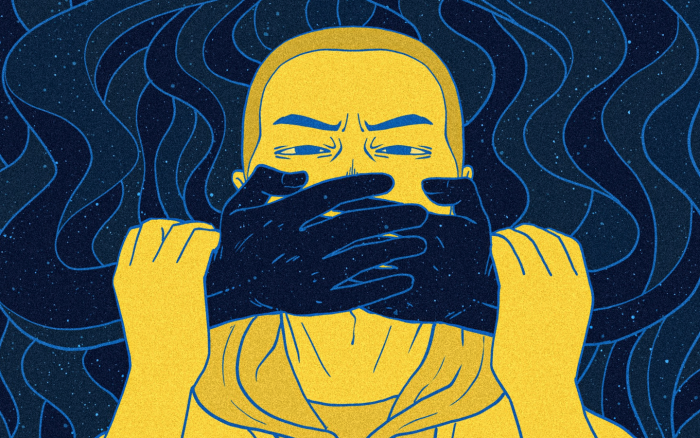Our workaholic culture celebrates and rewards the ability to repress our emotions and ignore our personal lives in favor of “getting the job done.”
From an early age, children are taught that much of their value depends on their ability to perform—first in school and sports, then in college, and finally in the workplace.
We’re taught that our personal feelings should be secreted away in our private lives, and we should only present our cheerful, can-do attitude to the world.
The problem this, those repressed feelings eventually find a way out. The deeper and harder they’re repressed, the more explosive the final release is.
Right now, as COVID-19 robbed us of our usual distractions and coping mechanisms, we’re witnessing a lot of explosive releases of pent-up emotions.
This cycle of repression and release became striking clear to me in a recent incident in my life. A minor mix-up in ordering a new phone vaulted me into a blind fury.
The battery on my trusty, old iPhone started putzing out during a cold spell—dying as soon as I unplugged it from the charger.
It was over two years old, and we all know they build these things to die early, so I figured it was time to bite the bullet and order a new one. I hopped on the website of my pre-paid wireless carrier and ordered a new iPhone SE2.
A few days later, I received an email saying, “Your order was successfully canceled.” That was it; no explanation or additional information. (It was quite perplexing.)
I logged onto the company’s website and chatted with a customer service representative who told me I had to talk to a different company about my order—a company I had never heard of before—which deepened my confusion and frustration.
When a rep from that second company told me they also had no record of my order, that’s when I lost it. I managed to restrain myself from personally attacking that undeserving customer service rep, but I did snarkily ask, “Is this a real company?”
And when she asked if I wanted to place the order again, I rudely replied, “Don’t bother,” and closed the browser window in a huff of righteous anger. (That’s “losing control” for me. I try to be exceedingly nice to customer service reps because they unfairly receive so much grief.)
I felt bad about the interaction but then got to work and went through the rest of my day.
Yet, that incident kept haunting me. I was in a blind rage in that moment—totally irrational, thinking of nothing but lashing out at others. My emotional response to that situation was totally disproportionate to the minor inconvenience I experienced, and I wanted to figure out why.
So later that night, I had time to sit down and dig in: what made me so angry?
(One benefit of social distancing: we don’t have many better options than examining our emotions.)
I replayed the events leading up to my outburst in my head. I remembered that in addition to the email about the cell phone, at that same time, there was a slew of other emails—including one about a studio I was looking into renting, which contained another page-long message from an overly-thorough landlord who required a fair amount of patience to work with.
I remembered the brief surge of emotions around that email too. They flared up but were quickly repressed—emotions of fear and uncertainty about my future.
I’ve been looking into settling down in a town, ending my two years of nomadic wandering, and locking myself into a lease with much higher monthly payments than the RV park I’m currently inhabiting. I’ve been considering this because I think I’ve found the perfect place to work in service of my Dharma.
A friend is trying to save his dying church by evolving it into an interfaith spiritual community, The Abbey of the Redwoods, and he’s looking for someone to teach yoga and meditation—I’ve been looking for a place to teach. (One of those magical coincidences that make us feel like the universe is looking out for us.)
I’m also considering cutting back on my work hours to devote more time to the Abbey, which would mean relying more on my savings.
Fortunately, after selling my soul to big pharma for 10 years, I have savings to rely on. But there’s risk involved. And fear.
Fear that I have been avoiding and repressing. I haven’t wanted to admit the risk I’m taking.
What if I devote my heart, time, and energy to this community and fail to make it self-sustaining?
What if I follow my heart off a cliff and wind up with nothing to show for it but a depleted bank account?
Those are real possibilities—ones that I didn’t want to acknowledge. Ones that I’ve been repressing.
Whenever the doubt and fear crept up, I just pushed it out of my mind, choosing to focus instead on the future, believing everything will work out exactly as it should—spiritual bypassing in all its magnificent glory.
Finally, those pent-up emotions burst through the dam of repression and raged out of me in the form of anger (directed at an innocent customer service rep).
This is a minor, rather petty, example of what we’re seeing around us on a national and global scale. We’re all scared; the future is a landmine of uncertainties right now. Our health, our income, and our lifestyles are all in freefall. For a hot second, it seemed our democracy was in danger.
We’re all scared, and we’ve been repressing that fear because we’ve never been taught to sit with our emotions. Instead, that fear is boiling over into anger—screaming matches with loved ones, riots, protests, and even attempted coups.
When we find ourselves frequently erupting in fits of rage, there’s a chance it’s because we have repressed feelings we need to face.
Here are four telltale signs that indicate we’re ignoring emotions:
1. Instead of feeling intense emotions as they arise, we intently look somewhere else.
In my case, when doubt about my future came up, instead of sitting with the fear, I pushed it away.
2. The same emotions keep bubbling up.
When the same little pang of emotion continually pops up into our conscious thoughts, that’s a clear sign it needs to be faced. After the fifth, sixth, seventh times I crammed those fears back down, I should have realized it was something I needed to address.
3. We experience a disproportionate emotional response to an event—seemingly exploding out of nowhere.
Yes, the mix-up with the phone was annoying, but it did not warrant the irrational fury that erupted in response.
4. We struggle to focus on other things.
Our minds are constantly churning—bouncing from thought to thought. This often happens because the subconscious is trying to direct us back to the feelings that we’re avoiding.
When my thoughts kept returning to the phone incident throughout the day, I finally admitted it was time to break out the pick-ax and start digging into my emotions.
If we’ve been repressing emotions for years, we may be experiencing these signs so frequently we don’t notice them. This may become our normal state.
That’s a sign we need help; we need to talk with someone who can help us dig into our jumbled mess of emotions and start feeling those feels.
It will be unpleasant at first, but it will be worth it—for ourselves and everyone else in our lives.
Here’s a recent talk I gave on this subject:







Read 27 comments and reply